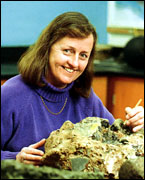
|
 |
Research > Institutes > Deep Ocean Exploration Institute
Deep Ocean Exploration Institute

Susan Humphris
Institute Director
|
 |
The Deep Ocean Exploration Institute investigates processes that shape Earth’s surface, regulate the chemistry of its oceans, and impact its inhabitants. The objective is a better understanding of how Earth works. While continuing studies under the initial broad theme, “Seafloor Observatory Science and Instrumentation,” the Institute initiated a second cross-disciplinary theme, “Fluid Flow in Geologic Systems,” in 2002. Fluid flow influences many processes that modify Earth; for example, interactions between fluids, rocks, and biologic systems form oil and gas, spawn exotic ecosystems at hydrothermal vents, and probably nurture a deep biosphere beneath the seafloor. Fluid flow was the principal topic for the 2002 Geodynamics Seminar for students and staff. It is also the theme for new research projects that include a pilot program to determine whether gas hydrates can be mapped to depths of 20 meters (66 feet) below the seafloor with a towed electromagnetic system (Rob Evans), and an experimental study to examine how microbes grow by oxidizing iron in volcanic rocks (Wolfgang Bach and Katrina Edwards).
Notable Institute events in 2002 included a special online “Dive and Discover” expedition that returned to the Galápagos Rift where hydrothermal vents were first discovered 25 years ago. The Institute also produced and distributed 10,000 copies of an educational CD-ROM documenting this discovery and its scientific legacy. In October, the Institute held a workshop for scientists interested in adapting recently developed space and land-based geodetic techniques to studies of seafloor deformation-an issue with implications for detection of Earth’s movements, seafloor stability, and the generation of tsunamis.
In 2003, DOEI Fellows Meg Tivey, Dana Yoerger, and Jean Whelan will continue investigations related to seafloor observatory science and instrumentation. Their efforts will be particularly pertinent to a July workshop (co-sponsored with NSF, ONR, and the Ocean Life Institute) on “The Next Generation of In Situ Biological and Chemical Sensors in the Ocean.”
—Susan Humphris, Institute Director
|
|
